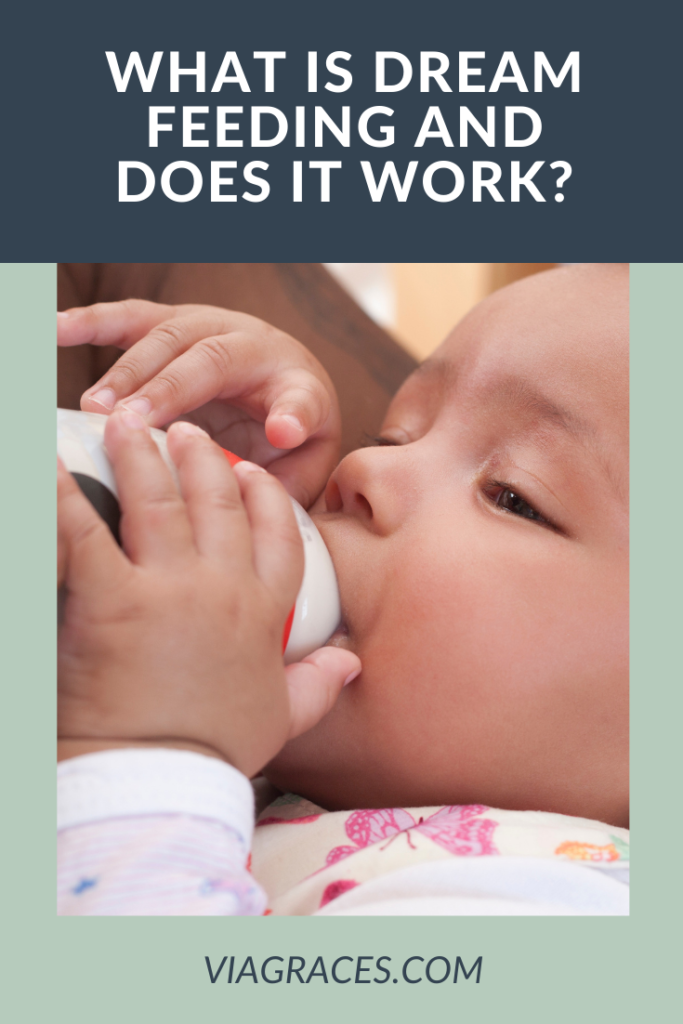Dream feeding…I had never heard of it until I had my newborn and I was really confused by the concept. Now, as a mom of three and also having a job that’s very much in the baby world, I hear about dream feeding all the time!
So let’s talk about the ins and outs of dream feeding! In this post, I will walk through:
- What a dream feed is
- If dream feeding actually helps babies sleep longer
- Why we don’t recommend dream feeding
- What to do if your doctor recommends you wake your baby for night feeds
- How to stop dream feeding your baby
And more!
What is a dream feed?
A dream feed is a parent-initiated feed that happens a few hours after you’ve put your baby to bed for the night.
It is most commonly done with newborns, however I know some families with older babies dream feed, as well.
The idea behind a dream feed is before you, the parent, go to bed at night, you get your baby out of the bassinet or crib while they’re still sleeping and try to keep them sleeping while you nurse them or give them a bottle. You’re trying NOT to wake them up.

So you top your baby off one last time before you go to bed, and the hope is that dream feeding your newborn will help them essentially “skip” a night waking.
It’s the worst feeling when you’ve just laid down, you’re almost asleep, and all of a sudden your baby is awake. So the goal of dream feeding is to not only extend your baby’s time asleep but also keep your sleep from being disrupted!
Example of a baby’s schedule with a dream feed:
- 7:00 pm last feed before bedtime
- 7:30 pm bedtime
- 10:00 pm dream feed (and parents’ bedtime)
- 12:30 am wake for feed
- 4:30 am wake for feed
- 7:30 am wake for the day and feed
Example of a baby’s schedule without a dream feed:
- 7:00 pm last feed before bedtime
- 7:30 pm bedtime
- 10:00 pm parents’ bedtime (no dream feed)
- 11:30 pm wake for feed
- 3:30 am wake for feed
- 7:30 am wake for the day and feed
Note that the above schedules are just examples, your baby is in no way expected to follow these schedules!
Does dream feeding actually help babies sleep longer?
Well, a dream feed certainly gets some milk into your baby’s belly. And in the short term, it might help your baby sleep a bit longer.
But it also might not!
You may successfully dream feed your newborn, but they still wake up 30 minutes later because they just need some snuggles or they aren’t used to longer stretches of sleep just yet. And some older babies have trouble getting from one sleep cycle to the next, regardless of hunger, so they may still wake up after their next sleep cycle, too, even though they’re not technically hungry.
The dream feed could also backfire.
One, your baby might fully wake up instead of staying in that snoozey state, and it may now be harder to get them back to sleep. Or two, your baby may just not want to eat! No matter what you do, your breast or that bottle is in their mouth, but they’re just asleep.
So as sleep consultants, our goal is to teach babies and children independent sleep habits. Meaning they don’t need to feed to sleep, rock to sleep, be patted to sleep, or co-sleep. And independent sleep can absolutely include night feedings when a baby still needs them, but here at Via Graces, we don’t recommend dream feeds.
Why we don’t recommend dream feeding, especially when sleep training
Whether your baby is six weeks old or six months old, we don’t recommend dream feeding for the following reasons:
1. We want to focus on full feedings
If your newborn is asleep while feeding (which is the goal of a dream feed), they’re very likely not going to get a full feeding. Babies need to be awake for a nice and full feeding.
And if your baby isn’t getting a full feeding in that dream feed, they will likely be awake again soon for another feed. So let’s try to get nice and full feeds, whenever possible!
2. You might accidentally wake up your baby while dream feeding
The idea of a dream feed is to keep your baby asleep while you’re feeding them so you can lay them right back down and they’ll continue sleeping.
But if you accidentally wake your baby up in the process, you’re likely going to have a grumpy baby and you will have to work harder to help them back to sleep – definitely not the result you were hoping for.
On a similar note, lactation professionals recommend you don’t feed your baby while they’re swaddled. Eating is a whole-body activity, so your baby will get the best feeds when they have access to their arms and legs. So if you’re trying to dream feed, it’s ideal to unswaddle your newborn, which again, puts you in the “danger zone” of fully waking them up!

3. You might be starting a habit of waking at that old dream feed time
By giving your baby a dream feed every night around 10 or 11 pm, for example, you could be inadvertently teaching your baby to wake up at 10 or 11 each night.
Their little body clocks might learn that they always wake and eat around 11, so even when don’t need that feed, they’re still waking out of habit.
4. We want babies to recognize that food is for nourishment, not for sleep
We want our babies to know that the purpose of milk is to fill their little bellies, not simply for sleep. They of course need to eat well in order to sleep well, but they don’t have to be 100% full to fall asleep or stay asleep.
We want babies to be aware of when they are hungry and aware of when they are eating so they can feel the satisfaction of being full. In a dream feed, your baby is consuming calories, but their brain isn’t registering hunger or fullness – and we want them to connect what’s happening in their little stomachs to their brain.
When offering a dream feed, you are instilling the idea that food is for sleep; the idea that you need to be super full in order to keep sleeping.
If our eventual goal, however, is to teach babies to fall asleep independently and stay asleep all night (when they’re physically ready, of course), separating feeding and sleeping is a necessary step.
And yes, even for newborns who we aren’t yet sleeping training! Or for your older baby you’re not ready to sleep train yet.
So when you are feeding your baby, during the day or night, we recommend trying your best to keep them awake. You can tickle their toes, blow on their face, feed them in just a diaper, or even run a washcloth on their head and neck to help keep them alert.
There will certainly be times when your newborn falls asleep while nursing or while drinking their bottle. Those first six weeks, especially, it’s really hard to keep them awake during feeds. So I’m not saying never let your baby fall asleep while eating, but I am saying try to keep a space between sleeping and feeding, whenever possible.
One, this will help ensure your baby can get in a full feeding instead of dozing halfway through, and two, this will help your baby learn to fall asleep in multiple ways, rather than by just eating.
This is actually one of the tips in our daily routines for newborns freebie, so make sure you snag it!
What if the doctor recommends you wake your baby for night feeds?
It’s important to note that you may have to set an alarm to feed your baby every few hours overnight, due to weight concerns or other health issues. And if your doctor says to wake your baby, absolutely listen! Your baby’s health is of utmost importance.
However, if you need to have a specific feeding schedule at night, we recommend trying your best to make sure your baby is actually awake rather than dream feeding. So take them out of their sleep sack or swaddle, change their diaper, and try to keep them somewhat alert so they then recognize they’re back in their crib.
Make sure you also keep following up with your doctor at each visit, asking if you should continue to wake your baby for overnight feeds. Many doctors forget to mention it and we forget to ask, resulting in parents waking their baby every few hours for weeks or months on end when it’s no longer necessary! So keep checking in.
How to Stop Dream Feeding Your Baby
You just stop! This does not mean you stop giving your baby night feedings, but now we wait for them to actually wake up and signal that they’re hungry, and then feed them!
I worked with a family of a 4-month-old several months ago and before working together, they gave their baby a dream feed every night before they went to bed, and then he slept until 3 or 4 am, they’d feed him again, he’d go back to sleep, and wake up around 7 or so.
Falling asleep at naps and bedtime were really hard, which is why they reached out for help, but they were actually pretty happy with his nights once he fell asleep!
So when I told them I recommended they stop the dream feed, they were unsure. Here’s what I shared with them:
- I would love to know what their son actually needed. And when he’s getting a dream feed, we just don’t know!
- Their end goal was that he’d eventually sleep through the night once he was ready, but how would they know when he’s ready if they were giving him a dream feed every night?
- If he’s capable of just one feed in the middle of the night rather than two, I’d rather he get that more consolidated sleep.
- The goal is that babies get more calories during the day rather than overnight. And if they’re dream feeding him and then he’s getting a feed later in the night, that’s two feeds – so two opportunities for calories. But there’s a chance he might only need one feed in the night, likely fewer calories, and then he’ll wake in the morning ready for more calories. And again, the eventual goal is all the calories during the day and none at night, so let’s see how he naturally gets there.
After this conversation, this baby’s parents actually chose to keep the dream feed for another week, because they were too nervous to take it out.
But after a few days of working together, once they saw what he was capable of during the day and how well he was falling asleep at bedtime, they wanted to see what all he was capable of and dropped that dream feed! And he went down to just one night feed, around 1-2 am, and did so well.
Conclusion
When it comes to our little ones, there are SO many choices to make – how to feed them, what to feed them, what products to buy, what books to read, etc. And the overwhelm certainly doesn’t stop at baby sleep!
If you are listening, let me make this very clear. Dream feeding is not bad! It is not wrong. If you dream feed your baby and it works for you, I’m so so thankful! We always want you to do what you feel is best for your little ones.
But I’m guessing you’ll eventually want to stop dream feeding, or you might just be dream feeding because you heard it was a thing to do but you’re not really sure if it’s helping and you’re wondering when you can stop.
So if you’re reading this and have considered dream feeding, or are currently dream feeding but it’s just not working or you want to move away from it, yay! I’m so glad you’re here and it’s my hope that this blog post helped you think through all things dream feeding and what’s next for you and your baby.
If you’re expecting or have a newborn and you are totally overwhelmed by the idea of sleep, or your newborn’s sleep is just all over the place right now and you just want some direction… You want to know that they’re getting the best sleep possible, and you want to enjoy all the newborn snuggles…
Newborn Sleep from A to Z is our newborn sleep course that teaches you all things newborn sleep and also gives you a step-by-step plan for how to establish a sleep foundation from the start, while still enjoying so many cuddles! There are also options for add-on support if you’re looking for a more personalized approach.
With Grace,
Lauren
